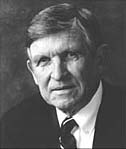
Introduction
Bob Deck, Smarmy Talk Show Guy
World's Fair V.I.P. Hosts & Hostesses
John Majors, Vol Football Coach
Richard Lakin & Charles Williams, Restaurateurs of the Unusual
Reggie Johnson, UT Basketball Hero
|
|

John Majors, Vol Football Coach
"I enjoy living" declares John Majors, "and I'm going to enjoy it as long as I am in good health."
The life that Majors and his wife, Mary Lynn, now enjoy is filled with travel, leisure, cultural and recreational pursuits in sharp contrast to his hectic, pressure-packed career as head football coach for 16 seasons at UT, five at Iowa State and two separate stints of four years each at the University of Pittsburgh.
During a recent week when college football staffs were scouring the country in annual pursuit of recruits, Majors divided his time between duck hunting in West Tennessee and a similar outing in South Carolina. He flew back to Pittsburgh on Friday in time to join Mary Lynn for an evening performance of the Pittsburgh Symphony. At the end of a restful weekend including Sunday church services, the Majors hosted a Super Bowl party in the so-called "Coach's House" where they still live on the University of Pittsburgh campus. The majors are buying the house from the university. They are raising an 11-year-old grandson.
Majors' title at Pittsburgh is special assistant to the chancellor and the athletic director. In that capacity, he speaks to groups including quarterback and touchdown clubs and other booster groups, raises money for the university from selected donors, talks to a few football prospects and sells a few season tickets. Majors plays a lot of golf.
Through its benevolent arrangement with Majors, Pittsburgh is taking care of one of its own. And his amicable relationship with the school that forced him out as football coach two years ago stands in stark contrast to the bitter estrangement to this day between Majors and his alma mater, UT, where officialdom axed his coaching tenure six years ago.
Majors remains among friends at Pittsburgh—officials who found it painful but necessary to ask him to step down as coach after a losing record over four seasons. Pittsburgh athletic director Steve Pederson was a recruiting coordinator for Majors at UT. The current Pittsburgh head coach, Walt Harris, was an offensive coordinator for the Vols under Majors. During an earlier four-year tour as head coach at Pittsburgh before resigning to "come home" to Tennessee, Majors led the Panthers to an undefeated season and a national championship in 1976.
"Pittsburgh has been great to me, and I will always be appreciative," says Majors. The arrangement is open-ended; he is not under contract. Now 63, Majors says he has no plans to retire or leave the university. Would he return to live in Tennessee in retirement?
Majors acknowledges the possibility—he misses his three brothers and sister and his many Tennessee friends—but says it is equally possible that he and Mary Lynn will choose to stay in Pittsburgh, which they love and now call home.
Does he miss coaching? Majors says he was "pretty well lost" for the first year and that transition to his current lifestyle may still be incomplete. Two years ago he faced the harsh reality that for the first time in 52 years he was not on a football practice field, dating back to when John and his brothers kicked and chased footballs around the high school field where their father coached in Lynchburg, Tenn. Majors also missed the structured life as a leader of a staff of assistant coaches and administrative personnel, and a full schedule of daily activities. He no longer keeps regular office hours and has no staff except for the secretarial support.
"I have enjoyed my life, and I enjoy living," repeats Majors, the former all-American single wing-back who led the Volunteers to an undefeated regular season in 1956. Of his falling out with UT and the loss of his job as a coach, Majors adds: "I have not let anger and bitterness keep me from enjoying my family and friends and many other things that I like. That won't change what I think of a half dozen people, including a couple that worked for me, a couple I worked for and a couple who were important" (apparently prominent alumni) in determining athletic policy. "I won't name any names." Majors calls it the "only time I was ever deceived by people I worked with and trusted...not all but a very few."
—Mike Miller

|





